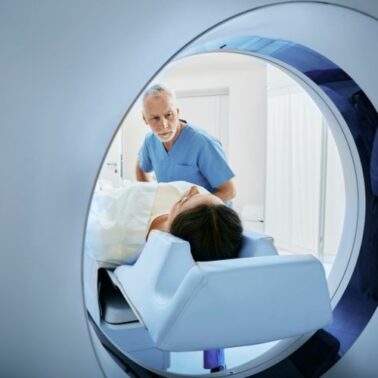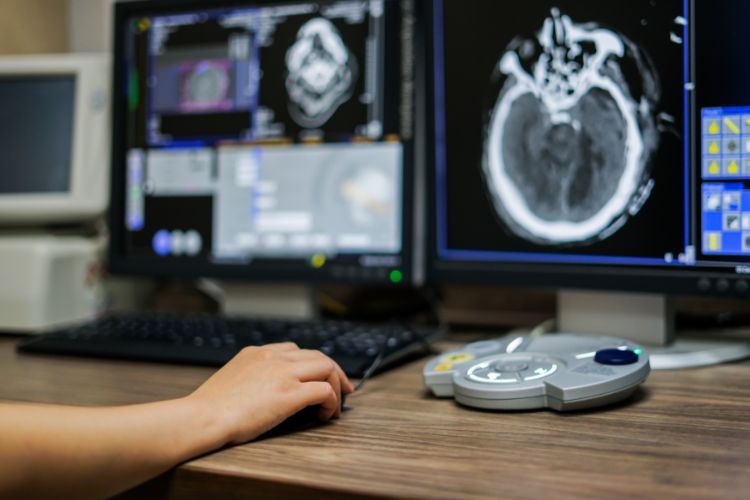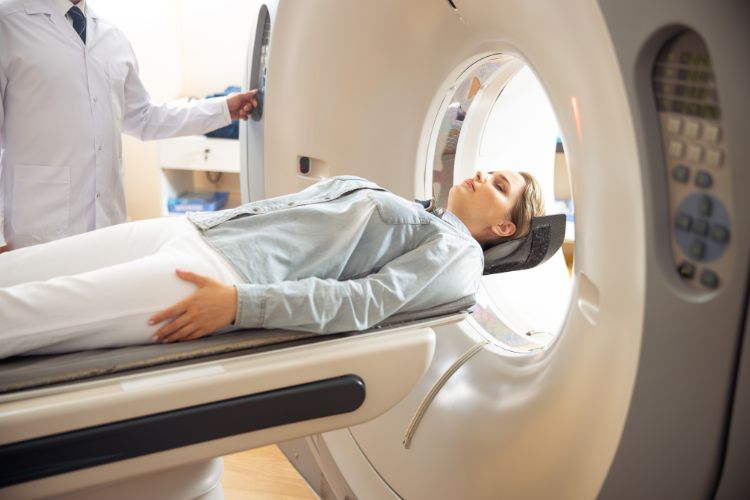
What To Expect from Your CT Appointment: A Step-by-Step Guide
Article reviewed by Dr. Richard Perry.
CT scans, sometimes called computed tomography scans, are vital in medical diagnostics. They use X-rays and computer technology to produce high-quality images of bones, organs, blood vessels, and tissues, leading to an accurate diagnosis and effective treatment planning for our patients.
The PRP Imaging team is dedicated to prioritising patient care and comfort with everything we do. If you’ve got an upcoming CT appointment, and you’re not sure what to expect, you have a family member or friend searching for a diagnosis, or you’re simply curious about the procedure, we’re here to answer your questions.
What is a CT Scan?
A CT scan is an advanced medical imaging technique that combines X-ray technology with computer processing to create detailed cross-sectional images of the body. So, what does that mean?
Unlike traditional X-rays, which provide a flat, two-dimensional view, CT scans capture multiple images from different angles. These images are then processed by a computer to produce high-resolution, three-dimensional views of bones, organs, blood vessels, and tissues.
To obtain these images, the patient lies flat on a table which moves through the CT scanner machine. An X-ray beam rotates around the body and captures information which is reconstructed into high-quality images.
What are CT Scans Used For?
CT scans are commonly used to detect and monitor conditions like tumours, infections, and blood clots. Doctors often recommend CT scans to evaluate injuries from accidents, including fractures and internal bleeding, and to plan and guide surgical procedures.
CT scans are also instrumental in diagnosing diseases of the internal organs, including the liver, kidneys, and lungs. For cardiovascular health, CT angiography is used to assess blood vessels for blockages and other abnormalities.

Before Your CT Appointment
How to prepare
Most CT scans require no preliminary preparation. Depending on the CT scan you’re having, there may be several preparation steps to make sure the results are accurate and that you have a smooth experience.
You should wear comfortable, loose-fitting clothing . For some scans, like those involving the abdomen or pelvis, you may be required to fast for a few hours beforehand.
Our reception staff will provide specific instructions depending on your CT scan type and other factors. If you have any questions, don’t hesitate to ask before your appointment.
Your medical history and other concerns
Bring your referral letter, Medicare details, medication list and any previous imaging results related to the area being scanned. If your appointment a part of an insurance claim, please make sure you also have the insurance case details and a copy of the examination approval letter.
Your healthcare professionals should be aware of your medical history, including any previous reactions to contrast materials or medications, and any existing conditions such as allergies or kidney problems. If you’re pregnant, or suspect you might be, you should let your doctor and radiology staff know immediately.
This information helps your healthcare team take any necessary precautions and tailor the procedure to your needs, which is beneficial for your safety and comfort and accurate results.
During Your CT Scan
When you’re called in for your appointment, depending on the type of CT, you may need to change into a gown.
If you do require an iodinated contrast injection for your test, it is likely that you will be taken into an area where a radiographer will discuss iodine contrast with you. They will then use a needle to insert a cannula (a small plastic tube) into a vein in your arm or the back of your hand so that the iodine contrast can be inserted into the cannula during the test.
You’ll then be asked to lie on a motorised table that slides into the CT scanner. The technician will position you correctly.
If a contrast dye is needed, it’ll be injected into a vein in your arm or hand. The table will then move slowly through the circular opening of the scanner as X-ray beams rotate around your body, capturing image slices.
Staying calm and comfortable
During the scan, you might hear whirring or clicking sounds from the machine. If you receive contrast dye, you might feel a warm sensation or a metallic taste in your mouth. Some patients can find these sensations and sounds anxiety-inducing.
The scan itself is painless and typically lasts between 10–30 minutes.
To stay calm and comfortable, try to focus on breathing slowly and evenly. Tell your technician if you feel anxious — they can reassure and support you. Closing your eyes and visualising a peaceful place can also help.
The procedure is quick, and you can get back to your normal routine and activities shortly after.

After Your CT Appointment
After the CT scan, you can change back into your clothes and follow any specific instructions given by our staff.
If you receive contrast dye, it’s helpful to drink plenty of water to help flush it out of your system. Allergic reaction is rare but watch for any allergic reactions and contact your doctor as soon as possible if you experience any unusual symptoms.
The radiologist will analyse the images and send a detailed report to your referring doctor, usually within a few days. Your doctor will discuss the results with you and plan any necessary follow-up appointments.
FAQs
Q: What are the symptoms of an allergic reaction to the contrast?
A: People who are allergic to the iodinated contrast used in CT may have some of the following symptoms:
- nausea and/or vomiting;
- a skin rash or hives;
- itching; sneezing or watering eyes;
- dizziness and/or headache;
- gagging or feeling of suffocation, or swelling of the inside of the throat or mouth;
- change in blood pressure
If you do feel any of these symptoms during or after your scan, it is important to tell the technician or nurse immediately. Allergic symptoms rarely develop after after leaving the radiology practice, but you should return there immediately , or attend the nearest doctor or emergency department if they do.
Q: Can I eat or drink before a CT scan?
A: It depends on the type of scan. Always follow the specific instructions we give you at the time of booking.
Q: Will the CT scan hurt?
A: No, CT scans are painless. You might feel a warm sensation if contrast dye is used.
Q: What if I’m claustrophobic?
A: You should let your technician know, and they’ll provide you with support throughout the entire process. The scanner is also relatively open, which may help ease your anxiety and discomfort.
Q: Are CT scans safe for everyone?
A: CT scans are generally safe, but you should let your doctor know if you’re pregnant or have allergies to iodinated contrast dye.
Q: How long does a CT scan take?
A: Most CT scans take between 10 and 30 minutes.
Q: What is a CT Calcium Score Test?
A: A CT Calcium Score test measures calcified plaque in your heart’s arteries, helping to assess the risk of heart attack or stroke.
Q: When can I expect the results?
A: The technician will not be able to give you any results after the scan; this is the responsibility of your doctor and the radiologist who interprets the pictures from the scan and provides a report to your doctor, normally within 1 – 2 business days

Tips for a Smooth CT Experience
Arrive early to avoid rushing and give yourself time to relax and breathe. Stay calm by practising deep breathing and visualising a peaceful place.
You should always follow the preparation guidelines given by our staff, including orders to fast or hydrate. This will make sure your results are accurate and that you have a smooth experience.
Let your technician know if you have any concerns, allergies, or discomfort. Don’t hesitate to ask questions about the procedure, communication will help your technician tailor the experience to your needs.
How PRP Imaging Can Help
At PRP Imaging, we offer a wide range of diagnostic imaging services, including CT scans, performed by highly skilled radiologists.
Our team is dedicated to providing accurate results and comprehensive care. We put patients first and do everything we can to give you a stress-free experience.
Our goal is to deliver high-quality imaging services in a compassionate and comfortable environment.
Ready for your CT Scan?
Understanding what the CT scan process looks like can help ease your anxiety and create a smooth experience.
Being well-prepared by following your provided instructions, communicating with your technician, and knowing what to expect can make your appointment stress-free and seamless.
PRP Imaging is here to give you top-quality care and patient support. Our friendly staff are here to help you.
To schedule an appointment or find more information, visit our website or reach out to your local PRP clinic today.
